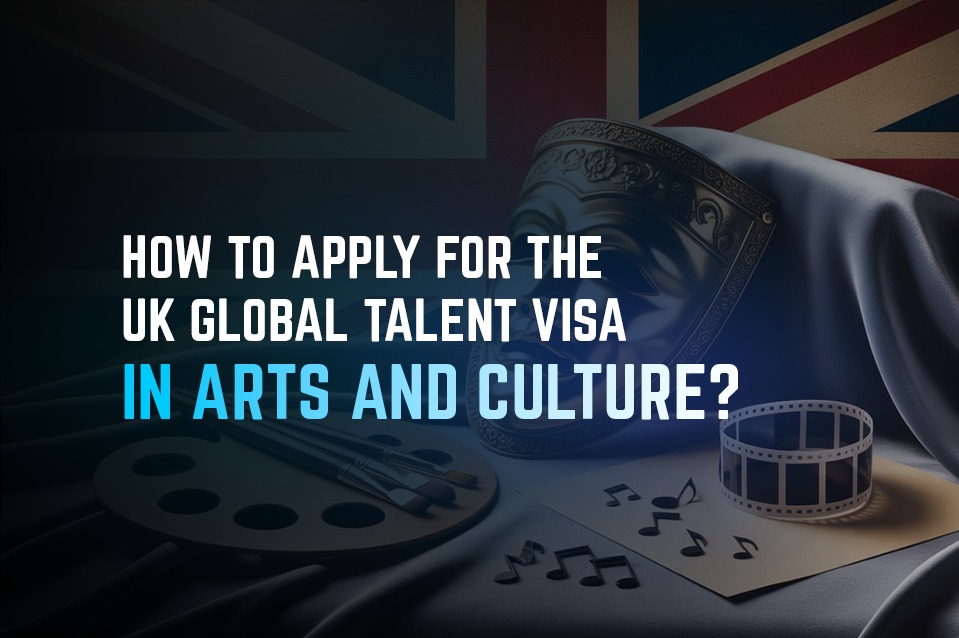
For art professionals with international impact or rising potential, the UK Global Talent Visa presents a rare opportunity to live, work, and create freely in one of the world’s most dynamic cultural landscapes. Whether you’re an award-winning visual artist, an emerging choreographer, or a curator shaping museum narratives, this guide is written for people like you, artists who are serious about their work and looking to take the next step. Whether you’ve built a career over the past decade or you're just starting to gain traction internationally, here’s what you need to know.
Understanding the UK Global Talent Visa Endorsement
What Is the Global Talent Visa?
This is the UK’s visa route for individuals who are:
- Exceptional Talent: established professionals with an international track record
- Exceptional Promise: emerging creatives with strong early achievements
Who Is This Guide For? (Arts Council England Route)
Arts Council England (ACE) is the endorsing body for the following disciplines:
- Combined Arts
- Dance
- Literature
- Music
- Theatre
- Visual Arts
If you work in fashion, film, television, architecture, or animation, your endorsement will be assessed by other designated bodies. We explain those briefly below, but this guide focuses on Arts Council England’s endorsement route.
Related Creative Fields with Different Endorsing Bodies
While Arts Council England handles applications in core cultural disciplines, other creative industries are assessed by their own specialist organisations. If your work falls into one of these categories, you may need to apply under a different endorsement body:
- British Fashion Council: Fashion Design Industry
- Royal Institute of British Architects (RIBA): Architecture
- Producers Alliance for Cinema and Television (PACT): Animation, Film, Post-production, Television, and Visual Effects
These routes fall outside the remit of Arts Council England, but are still part of the broader UK Global Talent Visa scheme for the creative sector. If you're applying in one of the above, follow the specific endorsement criteria for that body. Do not submit to Arts Council England.
Why is Endorsement Mandatory for the UK Global Talent Visa?
Before applying for the visa itself, you must secure an endorsement confirming your status as a leader or emerging leader in your creative field. The UK Home Office will forward your application to the relevant endorsing body (e.g. Arts Council England), which will assess your eligibility based on professional merit, contribution, and international standing.
Key Documents for Arts Council England Endorsement
1. CV or Resume
List your professional experience and education (if relevant).
- For Exceptional Talent: Your CV should reflect at least 5 years of sustained work.
- For Exceptional Promise: At least 3 years.
2. Three Letters of Support
- These letters must come from organisations or individuals with recognised expertise in your field.
- At least one must be from a UK-based cultural organisation.
- Letters should speak specifically about your impact, role, and how your work contributes to the arts.
3. Media Recognition
- You need at least two examples of independent, critical reviews of your work.
- These must come from credible national or international outlets.
- The content must discuss completed work, not just announcements or promotional pieces.
4. International Awards
- You must provide evidence of winning (or contributing significantly to) a credible international award.
- Awards should be from the past 5 years.
- If the award was received as part of a group, you’ll need a signed statement outlining your individual contribution.
5. Proof of Appearances or Distribution
- Your work must have appeared professionally in at least:
- Two countries (Exceptional Talent)
- One country (Exceptional Promise)
- Examples include:
- Event programmes or posters showing your name and role
- Screenshots of work distributed globally (e.g., streams, sales, downloads)
- Supporting statements verifying your contribution to group work
Important: Social media posts, informal flyers, and student or unpaid work won’t be accepted. Evidence must be official, dated, and supported by documentation.
Assessment Criteria (Arts Council England)
Arts Council England assesses applications using three main areas. You need to meet at least two.
- For Exceptional Talent:
- Significant media coverage
- Recognised international awards
- Professional appearances in at least two countries
- For Exceptional Promise:
- National or international coverage (including blogs)
- Relevant awards
- Professional work in at least one country
Every piece of evidence you submit should point to your professionalism, consistency, and the way your work has resonated beyond your immediate circle.
Common Mistakes That Lead to Rejection
- Submitting promotional flyers instead of critical reviews
- Using letters that are too generic or not specific to your work
- Failing to translate documents or format them correctly
- Sending evidence of student, amateur, or unpaid work
Take the time to prepare carefully. This isn’t about volume, it’s about clarity, quality, and relevance.
Get Expert Support from Themis Technologies
The endorsement process can be complex and highly competitive, but you don’t have to do it alone.
We are Themis Technologies, a UK-based endorsement advisory that specialises exclusively in the UK Global Talent Visa endorsement route. We support artists, performers, curators, and creators by:
- Helping you build a compelling endorsement case
- Reviewing and refining your portfolio and letters of recommendation
- Guiding you through the endorsement body’s criteria
- Ensuring your documents meet the highest professional standard
Our team includes professionals with deep expertise in the arts and cultural sectors. At Themis, we don’t just handle paperwork; we help you craft your story and position your creative achievements effectively. Let our experts evaluate your profile. Share your CV at gtv@themistl.co.uk for a free eligibility check.







